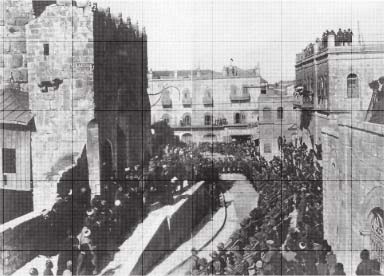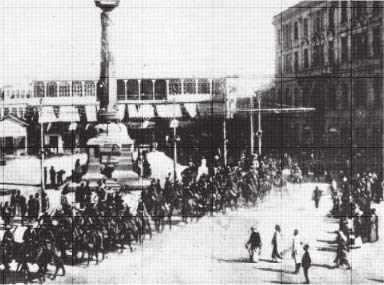A Peace to End all Peace (65 page)
Read A Peace to End all Peace Online
Authors: David Fromkin

VIII
Like Iraq, Transjordan continued to be a subject of concern at the Colonial Office. But where Feisal seemed too independent, Abdullah seemed too inactive; the Hashemite solution to Transjordan’s problems was not taking hold.
One reason for employing Abdullah in Britain’s service had been the argument that it would restrain him from attacking French Syria. T. E. Lawrence later claimed to have reassured Churchill that “I know Abdullah: you won’t have a shot fired.”
58
The shrewd and indolent Arabian prince was usually not inclined to engage in risky trials of strength. Indeed, within weeks of Abdullah’s employment as temporary governor, British observers began to conclude that he was too weak to govern. In April, Abdullah’s authority was challenged when delegates he had sent to mediate an intertribal dispute were murdered; instead of crushing the revolt, Abdullah appealed to the British High Commissioner to do it for him. The High Commissioner responded by authorizing the use of British airplanes and armored cars, but it had been precisely in order to obviate the need for using British armed forces that Abdullah had been installed in Amman.
At about the same time, France’s ambassador in London protested that Abdullah’s presence in Transjordan acted as an incitement to violence against the French in Syria. The British contention was that, on the contrary, Abdullah would prevent such violence. Soon it appeared that he was unable or unwilling even to do this. In late June, four men ambushed and attempted to assassinate General Henri Gouraud, the French conqueror and governor of Syria. “It is on the Transjordanians that suspicion falls,” Churchill was informed by his High Commissioner in Palestine.
59
The French authorities lodged a protest against the failure of Britain and Abdullah to prevent such attacks. They protested further when the alleged assassins were observed moving about freely in Transjordan.
The British High Commissioner was unhappy with the results of the Abdullah experiment, and told Churchill so in June. He reported to Churchill that one of the many causes of popular discontent was that native Transjordanians looked upon Abdullah’s Syrian associates as wasteful and incompetent.
60
At the same time, the commanding general of the British army in Egypt and Palestine wrote that “in Trans-Jordania Abdulla is a fraud…If anything is to be made of him he must be given a good strong Englishman who will run him entirely and British troops to back him up.”
61
A bit later Hubert Young told Shuckburgh that “What we have got to face is either continued expenditure on Abdullah, whose influence has gone down almost to vanishing point, and who is no longer a substitute for even a section of Infantry, or to take our courage in both hands and send a small force over, if only temporarily…”
62
Practically alone in the British government at the time, T. E. Lawrence continued to discern uses—albeit temporary ones—for Abdullah in Transjordan. “His total cost is less than a battalion; his regime prejudices us in no way, whatever eventual solution we wish to carry out, provided that it is not too popular and not too efficient.”
63
As the British government still could not decide whether to detach Transjordan permanently from Palestine—either by establishing it as a separate entity, or by allowing King Hussein to annex it to the Hejaz—the notion that Abdullah’s temporary regime would postpone the day of decision was an attractive one. However, Lawrence’s claim that the Abdullah solution cost the least money was the argument best calculated to appeal to Winston Churchill.
Abdullah demonstrated that he intended to be helpful to Britain by signing an Anglo-Hashemite treaty that Lawrence brought out with him to the Middle East. Lawrence came as Churchill’s plenipotentiary, and had spent months in the Hejaz attempting to persuade King Hussein to sign the treaty. The treaty was to be a comprehensive settlement of all the claims advanced by Hussein for himself and the Arabs ever since the early days of the First World War. Its terms included confirmation that Britain recognized him as King of the Hejaz and would pay him an annual subsidy of 100,000 pounds; but he, in turn, was required to recognize the French Mandate for Syria and the British Mandate for Palestine. At times Hussein said he would sign the treaty, but then he would change his mind. At one point, according to Lawrence, Hussein demanded “recognition of his supremacy over all Arab rulers everywhere.”
64
Lawrence believed that the old man of Mecca had become impossible to deal with. He secured Abdullah’s signature on the treaty; in view of Hussein’s rejection of it the signed document was rendered meaningless, but Lawrence seems to have appreciated Abdullah’s attempt to be helpful.
After a few months as governor of Transjordan, Abdullah began to change his mind about future plans. At the beginning he had allowed the British to understand that he intended to stay in Transjordan only for a short time because the territory was relatively unimportant to him in view of his large ambitions elsewhere. In any event, T. E. Lawrence was sure he could talk Abdullah into leaving when the time came. In October 1921, however, Lawrence reported that Abdullah intended to stay on. Abdullah aspired to ascend the throne of Syria and, apparently, new developments had encouraged him to believe that within a short time France might be ready to negotiate a reconciliation that would allow him to achieve his goal; so his inclination was to remain in the vicinity.
At the same time, the need to replace Abdullah by a more effective ruler seemed to become less urgent. H. St John Philby, a forceful British figure—one of the great explorers of Arabia—became the new official adviser to Abdullah; and, even more important, Lawrence’s friend Colonel F. G. Peake began whipping into shape a Bedouin force of regular troops under British command, which later—under his successor, John Glubb—became the formidable Arab Legion. The law and order situation seemed to be improving along the lines Lawrence had advocated, that is to say, without spending a significant amount of additional money. Lawrence began to believe it might be a good idea for Abdullah to stay on after all.
But to maintain Abdullah—an Arabian—as ruler of Transjordan, and to maintain Transjordan as an Arab preserve, in which Jews could not settle to build their homeland, was to depart from the Balfour Declaration policy of fostering a Jewish National Home. If the British were indeed planning to make Palestine into a Jewish country, it was hardly auspicious to begin by forbidding Jews to settle in 75 percent of the country or by handing over local administration, not to a Jew, but to an Arabian. The Balfour Declaration policy was embodied in the League of Nations Mandate entrusting Palestine to Britain, and in 1921–2 the Mandate—commissioning Britain as trustee of Palestine with the mission of creating a Jewish National Home while protecting the rights of non-Jews as well—was in the process of being offered by the League of Nations to the British Parliament for acceptance. Since Churchill’s temporary decision
not
to encourage—or even allow—the building of a Jewish National Home in eastern Palestine ran counter to the provisions of the Mandate, he decided to change the terms of the Mandate, which was redrafted to provide that Britain was not obliged to pursue the Balfour Declaration policy east of the Jordan river.
The Zionist leaders worried that shrinking their eastern frontiers would cripple their program, the more so because, in negotiating with France to fix a boundary between Palestine and Syria-Lebanon, Britain had also surrendered territory on their northern frontier. Chaim Weizmann wrote to Churchill early in 1921 that the agreement with France “cut Palestine off from access to the Litani, deprived her of possession of the Upper Jordan and the Yarmuk and took from her the fertile plains east of Lake Tiberias which had heretofor been regarded as one of the most promising outlets for Jewish settlement on a large scale.” Turning to Transjordan, he wrote “that the fields of Gilead, Moab and Edom, with the rivers Arnon and Jabbok…are historically and geographically and economically linked to Palestine, and that it is upon these fields, now that the rich plains of the north have been taken from Palestine and given to France, that the success of the Jewish National Home must largely rest.”
65
Justice Brandeis, the leader of American Zionism, sent a cabled message to Balfour toward the end of 1921 making the same point, deploring the loss of the waters of the Litani river (in what is now Lebanon) and calling attention to the economic importance of the Transjordan plains.
66
Yet the Zionist leaders did not campaign strongly against the administrative separation of Transjordan; they regarded it—not without reason—as a merely provisional measure. So did the Colonial Office. Views of the leading officials differed, but Shuckburgh summarized the agreement he and his colleagues had reached by saying that it had been decided not to allow Zionism in Transjordan for the present but also not to bar the door against it for all time.
67
Churchill had not foreseen that by leaving Abdullah in Transjordan he would embroil Britain in the fierce Arabian religious war between the House of Saud and the House of Hashem; but, in 1922, only about a year after Abdullah’s arrival, the fanatical Wahhabi Brethren, the spearhead of Ibn Saud, rode across the undefined desert frontier to attack Abdullah. An estimated 3,000 to 4,000 Brethren raiders came within an hour’s camel ride of Amman (now the capital of Jordan) before being crushed by British airplanes and armored cars.
*
In succeeding years Britain was drawn into playing a far more direct role in governing and defending Transjordan than Churchill had intended and British officials soon came to look upon Abdullah as a problem rather than as a solution.
Nevertheless the Colonial Office’s temporary and merely administrative set of arrangements for Transjordan in time hardened into an enduring political reality. The Arabian prince with his foreign retinue settled in Amman and became a permanent new factor in the complex politics of the Palestine Mandatory regime. The recurring suggestion that Palestine be partitioned between Arabs and Jews ran up against the problem that 75 percent of the country had already been given to an Arab dynasty that was not Palestinian. The newly created province of Transjordan, later to become the independent state of Jordan, gradually drifted into existence as an entity separate from the rest of Palestine; indeed, today it is often forgotten that Jordan was ever part of Palestine.

29 The Union Jack is hoisted above Basra in January 1915

30 A street scene in Baghdad, which British troops entered in March 1917

31 The reading of General Allenby’s proclamation of martial law in Jerusalem in December 1917
